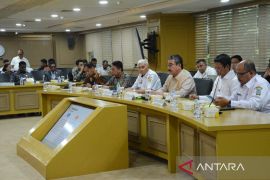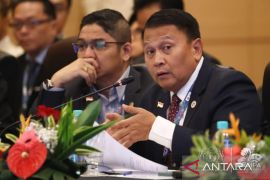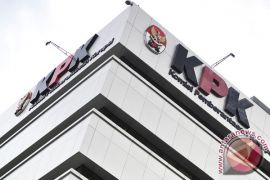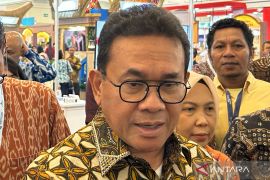"However, we reached a consensus on setting the growth rate at 5.3 percent, which we believe is quite conservative amid the global economic slowdown," BI Governor Agus Martowardojo said.Jakarta (ANTARA News) - Lawmakers have given different reactions to the economic growth target of 5.3 percent set by the government in the Draft 2017 State Budget (RAPBN 2017).
The growth target is being viewed as realistic by a House of Representatives (DPR) member, but other legislators consider it to be too optimistic.
Nurdin Tampubolon of Commission XI on financial affairs of the DPR noted that the economic growth target was quite realistic under the prevailing conditions.
"It is quite good if the target could be achieved amid the global economic slowdown," Nurdin stated when asked to comment on the financial notes given by President Joko Widodo (Jokowi) in a State of the Nation Address at a plenary session in Jakarta on Tuesday.
However, Deputy Chairman of the DPR Fadli Zon believes that the macro assumptions set in the RAPBN 2017 are too optimistic.
"In my view, they are not realistic in terms of both receipt and growth targets," he told the press after the government handed over its notes of the RAPBN 2017 and its financial notes to the DPR.
While addressing the plenary session, President Jokowi explained that the growth target was set based on the assumption that the global economy will improve.
"The outlook for the global economy is expected to improve. Nonetheless, we have to work hard to face the uncertainty that arises from the economic slowdown being witnessed in many developing countries as well as the prospects of economic recovery in the developed countries," President Jokowi remarked while delivering a speech on the budget plan for 2017.
President Jokowi unveiled the governments budget plan for 2017 on Tuesday, with total expenditure amounting to Rp2,070.5 trillion, which will be balanced by revenues worth Rp1,737.7 trillion and a deficit of Rp332.8 trillion.
In its RAPBN 2017, the government has set macro assumption targets that include an economic growth at 5.3 percent, crude price at US$45 per barrel, state treasury bill interest rate at 5.3 percent, rupiah currency rate at Rp13.3 thousand per US dollar, and inflation at four percent.
While elaborating on the revenue target, the president remarked that tax revenues were set at Rp1,495.9 trillion and non-tax revenues at Rp240.4 trillion.
"The non-tax revenue target is set at Rp240.4 trillion, although the government is facing heavy challenges as the prices of several mining commodities, such as natural oil and coal, are still low," the head of state explained.
He pointed out that the allocated expenditure of Rp2,070.5 trillion, included the central governments spending worth Rp1,310.4 trillion and regional transfer and village funds valued at Rp760 trillion.
"With the various agendas and development goals that I have conveyed, the fiscal policy for 2017 is still expansive and targeted to increase production capacity, while the budget deficit was targeted at Rp332.8 trillion or 2.41 percent of the gross domestic product," Jokowi noted.
The president stressed that the involvement of the private sector in development will be increased by enhancing cooperation between the government and businesses.
"I am convinced that with the trust and support of the people, the Indonesian government would be able to perform better and be more effective in its efforts to achieve the goals," he stated.
However, DPR Deputy Chairman Fadli Zon believes that the growth target was unrealistic. It is difficult to achieve the economic growth forecast of 5.3 percent for 2017 and even the growth target of 5.2 percent for this year, he emphasized.
The Indonesian economy grew by 5.18 percent in the second quarter of 2016, up by 0.27 percent from 4.91 percent in the previous quarter.
Zon, who is also a politician with the Greater Indonesia Movement Party, said economic growth must take into account external and internal factors, while the external factors are simultaneously experiencing a slowdown. As a result, it is difficult to realize the economic growth target.
"In my view, the government is still playing with an acrobatic value. However, I hope that it would still be realized," Zon remarked.
His colleague Sutan Adil Hendra, who is also deputy chairman of Commission X on creative economic affairs, expressed his view to make the growth target more realistic as the current target is difficult to achieve.
"Looking at the national and global economic conditions, the RAPBN 2017 is less realistic. Its budget (revenue and expenditure) plan is too high," Hendra noted in a press release on Wednesday.
However, the government is able to witness the positive impacts of introducing a series of economic policy packages since last year and is expected to serve as a stimulus for economic growth, particularly through sustainable infrastructure development.
In addition, the government disclosed that the inflation rate assumption in the state budget would remain at four percent.
"The improvement in national connectivity is projected to boost efficiency in the national logistics system. As a result, it can support the stability in commodity prices," President Jokowi pointed out.
Seconding the governments view, legislator Nurdin Tampubolon also expressed optimism with regard to the growth target. He said the economic growth target of 5.3 percent set by the government for 2017 is realistic.
Tampubolon of Commission XI believes that the target proposed by the government is quite realistic under the current conditions.
"It will be quite good if the target could be reached amid the global economic slowdown," Nurdin noted when asked to comment on the financial notes given by President Jokowi.
Bank Indonesia (BI), the central bank, described the governments economic growth target of 5.3 percent for 2017 as quite conservative amid the global economic slowdown.
The central bank had forecast the economic growth rate for next year at 5.2-5.6 percent, according to BI Governor Agus Martowardojo.
"However, we reached a consensus on setting the growth rate at 5.3 percent, which we believe is quite conservative amid the global economic slowdown," Martowardojo emphasized.
The economic growth target of 5.3 percent is higher than that of other countries as it is believed to have an impact on the sound and credible fiscal condition, he added.(*)
Reporter: Andi Abdussalam
Editor: Heru Purwanto
Copyright © ANTARA 2016





